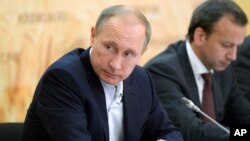Russian President Vladimir Putin travels to New York on Monday for a highly touted speech at the United Nations General Assembly — his first appearance at the international body in nearly a decade.
But Putin's trip to New York is also part of a wider effort to show the world he will not be sidelined on the international stage.
Russia's tacit war in Ukraine, Moscow's support for Syrian leader Bashar al-Assad, and the Kremlin's rollback of democratic freedoms at home have all soured relations with the West to levels not seen since the days of the Cold War. Even Putin's meeting with President Obama — announced Thursday — marks the first direct talks between the two leaders in nearly a year.
Indeed, disagreements between Moscow and Washington run so deep that arguments have already broken out over what topics will be covered and how the meeting came about — with the Kremlin saying it was arranged bilaterally and the White House insisting the meeting comes in response to repeated requests from the Russian leader.
Either way, White House officials say the talks reflect Obama's desire not to waste a diplomatic opportunity at a critical juncture.
"Given the situations in Ukraine and Syria, despite our profound differences with Moscow, the president believes that it would be irresponsible not to test whether we can make progress through high-level engagement with the Russians," said a White House official on Thursday.
Syrian gambit
Yet Russian analysts say it's Putin's recent Syrian gambit more than Ukraine that willed these talks into being. Washington simply had no choice given the changing military picture on the ground in Syria.
Over the past month, the Kremlin has continued to ferry arms and personnel to an air base in Syria's coastal province of Latakia, leading U.S. defense officials to conclude that Russia may be setting up a forward air operating base there. These moves prompted direct talks between top defense officials on both sides to try to ensure there are no hostile encounters between American and Russian aircraft in Syrian airspace.
But while Russia has remained coy about its military objectives in Syria, Moscow-based analyst Dmitry Oreshkin says the political calculus was obvious all along.
"Putin needs the West to have no choice but to meet with him," says Oreshkin. "He's already sent in troops into Syria. Putin's de facto already there so he's a player. And now the conditions are set for a deal."
Just what "deal" the Russian leader might seek is open to speculation. What he has to offer — less so.
In a regional summit in Central Asia earlier this month, Putin called for Western powers to join Russia in an international anti-terrorism campaign aimed at wiping out the Islamic State group, also known as ISIS.
"Simple common sense and responsibility for global and regional safety require uniting efforts of the international community [to fight] such a threat," argued the Russian leader. Russia's Foreign Ministry says Putin will return to this theme on Monday.
But Moscow's unwavering support for Syrian President Bashar al-Assad tand insistence that Assad be part of any future peace settlement with the Syrian opposition — complicates the offer. Western nations accuse the Syrian leader of war crimes and say he must go.
Russian officials have further muddied the picture by suggesting the Kremlin may go it alone in Syria should the West refuse Putin's offer.
It's a threat military analysts regard as more bark than bite.
"To change the situation on the ground in Assad's favor to defeat the opposition and ISIS we would need to deploy tens of thousands of troops. Maybe a hundred thousand in Syria," says Pavel Felgenhauer, a leading Russian military analyst.
"That's absolutely out of the question."
Public support fading?
Felgenhauer questions the level of public support for an extended military campaign — particularly if Russian boots are on the ground. Already this week there have been reports of Russian soldiers refusing deployment until the nature of their mission — and benefits to family members should they fall in harm's way — is made clear.
Yet observers say Putin's real aim in New York may be to offer Russian cooperation in Syria for an easing of Western sanctions imposed over Russia's actions in Ukraine.
Just how receptive Obama and other Western leaders are to that message may determine just how far Putin's loyalties to Syrian President al-Assad extend.
Either way, Felgenhauer says that the Russian gambit in Syria has proven a creative — if high-stakes — way to force the West to take Putin's plan for a grand anti-terror coalition against ISIS seriously.
"Moscow has been promoting that plan since June and no one was taking it seriously," says Felgenhauer. "Well, they are now."









